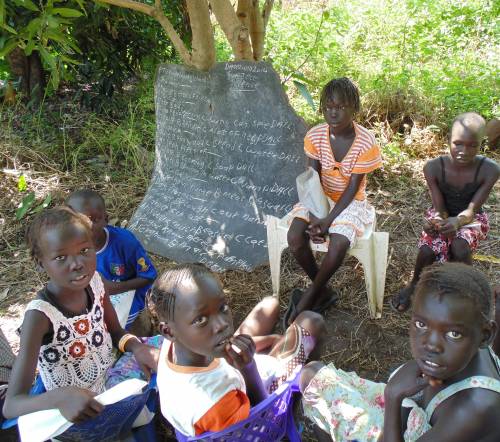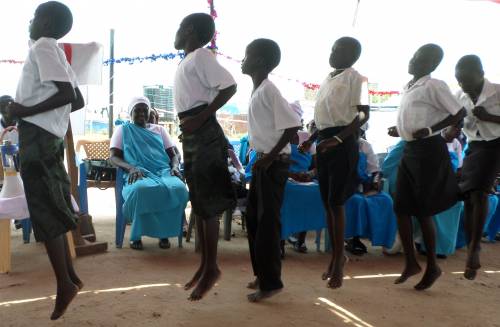A letter from Leisa Wagstaff in South Sudan
June 2015
Write to Leisa Wagstaff
Individuals: Give online to E200501 to Leisa Wagstaff’s sending and support
Congregations: Give to D504924 for Leisa Wagstaff’s sending and support
Churches are asked to send donations through your congregation’s normal receiving site (this is usually your presbytery).
Partners in Mission, greetings once again.
I would be remiss if I began this letter without first thanking God for each of you. The ways you continue to embrace missions has allowed hundreds of PC(USA) mission co-workers to minister to millions of people around the world, including “the least of these” here in South Sudan. Genuine gratitude flows from my core to you and I am heartened in my belief that with your continued partnership we can bring a semblance of hope toward peace and prosperity to a suffering country in spite of the on-again-off-again peace talks and continuing fighting. My South Sudanese colleagues’ determination to not give up as well as to stay committed to serving the Church is encouraged by each of you. The synod leadership always remarks that they could not have come this far without the companionship of the PC(USA) in general and the presence of its mission personnel in particular. I cannot count the many moments of just being present with them as they poured out their fears, heart wounds, and hopes for something better. Thank you in all of the 60-plus languages spoken by the South Sudanese.

“Under the Trees” Schooling
Most of the Presbyterian Church of South Sudan (PCOSS) departments now operate out of the capital along with the synod leadership. Although my colleagues are all Internally Displaced Persons (IDPs) with families scattered in UNMISS camps within the country and refugee camps in neighboring countries, the different ministries of the PCOSS continue.
The PCOSS Education Department director and I function as a mobile office. This means that the two of us meet wherever we can, most often “under the trees.” We shift or pack up our “office” several times during the day as the sun, dust or rain catches us or the surrounding noises become too much. This experience has helped us to greater empathize with our teachers and learners in similar situations and push for construction of classrooms with successful teaching and learning. We are taking small steps but nonetheless steps toward better educational opportunities for the country’s most precious resource—the children. The instability has required many adjustments to our plans for engagement. We are forced to concentrate in limited locations where pockets of peace exist and every place where our school population has congregated, including the camps.
A few days ago I visited a camp “school” where none of the basic amenities such as desks, chairs, didactic materials, or even drinking water existed. As I moved from the open shed that housed an “office” and two classrooms to the chinked mud and bamboo classroom block, a bunch of beautiful children ran up to greet me. Many thrust their schoolwork into my hands for examination and started chatting away. They were all eager to welcome the visitor, curiosity propelling them beyond any shyness. Other than their much-worn attire, dusty faces and feet, a few open sores, and signs of too little food, one not familiar with the situation would have a difficult time deducing that these kids had witnessed all the horrors of war and been forced to literally run for their lives. After shaking each and every little outreached hand, some a second or third time, I encouraged all to come to school on time, study hard, be kind to each other, pray, and reach for their dreams. They all jumped and shouted and clapped and laughed—all except some of the oldest pupils.

Singing and Dancing for Peace
This latter response worried me long after my visit. I feared the older ones did not believe me that one day their lives could be different, no matter how hard they followed all of the advice I had given. Their tender years were too filled with bad realities and perhaps I was promising them the impossible. Even if they did their part, would they have challenging and confident teachers, safe learning spaces, or opportunities to learn other than through the rote method and explore the world through books? Would their classrooms be occupied by soldiers and rebels? Could they sustain a dream of becoming productive citizens of the world? Maybe I had done a grave injustice. Instead of leading them into thinking that it was possible, perhaps I was setting them up for yet another disappointment; after all, the country’s history reminds us that the chances of an uninterrupted education are so slim.
Mobilizing the communities for new schools, providing didactic materials and basic school furniture to our volunteer teachers as well as helping them to be better equipped to teach in an emergency setting is only part of the task. When the opposing parties agree that with war, everyone loses, we have to be there to renovate and rebuild destroyed school infrastructure, accompany the teachers and students through their grief journeys, and aggressively promote literacy. We know that many children are being caught in the crossfire and becoming handicapped, making it even more difficult to hold onto the thin threads of hope. Therefore it is up to the education community to adjust negative attitudes—including its own—toward persons differently abled and make the school environment as welcoming and accessible as possible.
Whether you consider that your support is only a “drop in the bucket” or that your contribution will not matter, it can and will give these children the encouragement and opportunity they need to reach their fullest potential—even as president of a peaceful and reconciled South Sudan.
Shukran, tenotay, alakara, kataln, tambuahee, yincaleec, jekifiribii, ilalle and thank you once again in these and the more than 50 other South Sudanese tongues for your many forms of support. I feel your prayers, smile at your messages, and applaud the changes that your financial gifts are making; please continue. Send individual and congregational gifts to Presbyterian World Mission, PO Box 643700, Pittsburgh, PA 15264-3700. On the check’s memo line, write ECO numberE200501. Online gifts can be made at https://www.presbyterianmission.org/donate/E200501/.
In Ministry Together,
Leisa TonieAnn Wagstaff
Presbyterian Church of South Sudan (PCOSS)
c/o Juba, Central Equatoria State, South Sudan
leisawagstaff@gmail.com
This link gives more information on my journey with the South Sudanese: https://www.presbyterianmission.org/ministries/missionconnections/wagstaff-leisa/
The 2015 Presbyterian Mission Yearbook for Prayer & Study, p. 139
![]() You may freely reuse and distribute this article in its entirety for non-commercial purposes in any medium. Please include author attribution, photography credits, and a link to the original article. This work is licensed under a Creative Commons Attribution-NonCommercial-NoDeratives 4.0 International License.
You may freely reuse and distribute this article in its entirety for non-commercial purposes in any medium. Please include author attribution, photography credits, and a link to the original article. This work is licensed under a Creative Commons Attribution-NonCommercial-NoDeratives 4.0 International License.